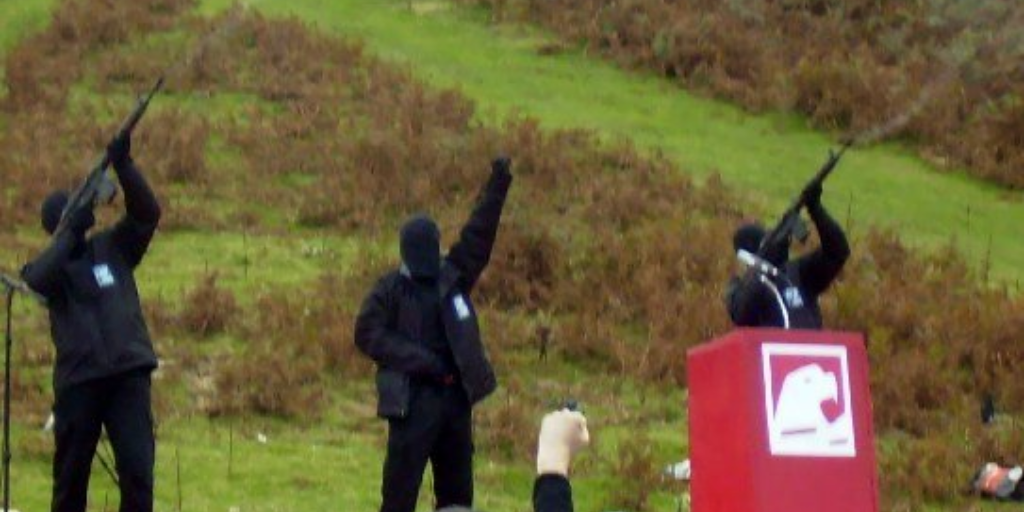Europe’s last home-grown terrorist group, the ETA in Spain, has disbanded.
Hi there, welcome to Plain English, the podcast that goes at the right speed for English learners. I’m Jeff and on today’s program we’ll talk about the ETA, the Spanish separatist group that officially disarmed and disbanded after four decades of armed resistance. In the second half of the show, I’ll show you how to use the English phrase “fight back.”
Today is Episode 48, so you can find the transcript online at PlainEnglish.com/48. Depending on where you personally are in your journey of learning English, you might find the transcripts helpful. If you find yourself not recognizing a lot of words, then reading along as you listen might be a good idea. It will help you associate the sounds with the words on the page—and it just might help out with your pronunciation, too. Just remember PlainEnglish.com/48 for the transcript of this very episode.
Europe’s last home-grown terrorist groups disbands
A long and bloody chapter in Spain’s history is coming to a close, as the ETA has officially disbanded. The ETA was a militant separatist group that waged a bloody campaign for independence of a region of northern Spain and southwestern France known as the Basque country. Over its four-decade existence, it was responsible for killing over 800 people and wounding thousands of others in terrorist attacks, mostly targeting police.
The group’s disbandment came slowly. It first declared a ceasefire in 2006, but was later responsible for a bombing at a parking lot at the Madrid airport. Then in 2010, it once again agreed not to commit any more terrorist attacks. The next year, it agreed to a permanent ceasefire, but refused to give up its cache of weapons. Last month, the group finally disclosed where it had been storing its weapons and said it had completely disarmed. And with that, Europe’s last home-grown terrorist organization is no more.
The group started in the 1960s as a student group that was fiercely opposed to the Franco military dictatorship. At that time, the Basque language was prohibited and any distinctive culture in the area was suppressed. The ETA fought back by staging violent attacks, killing 100 people a year on average in the 1970s, just as the Franco dictatorship was collapsing.
After Spain transitioned to democracy, the case for a violent separatist movement faded. While it’s true that the region is not its own country, despite having a distinct language, culture, and traditions, it does have more independence than any other region in Spain. It has a parliament, raises its own budget, controls its police force, and writes its own education curriculum. It is a relatively wealthy region today. The reason for having a violent separatist movement has diminished now that Spain is a democracy.
In the end, the ETA’s support collapsed because the people of Spain did not support the ETA’s methods any longer, as terrorism—violence and killing, essentially—as a tool for achieving political aims has failed in western societies. Even supporters of separatism acknowledged that using terrorism to achieve its aims was counter-productive. Most of the people killed by the ETA were police officers and local government officials.
One turning point for the group came in 1997 when they kidnapped a local government official and demanded that all the ETA’s prisoners be released before they would release the hostage. When the government didn’t agree, they shot and killed their prisoner, horrifying the people of Spain, who later demanded an end to the ETA. Even many of the ETA’s supporters over the years turned on the group.
Some who previously supported the ETA formed a political party called EH Bildu, which argues for the right of the Basque people to decide their own political destiny. As one leader described it, the conflict between the Basque people and the rest of Spain still exists, but with different parameters.
One thing left to decide now is the fate of 300 ETA prisoners who are scattered in different prisons across Spain. The local Basque government wants to house them locally, but the national government is wary of that, for now.
Spaniards and those in the Basque country will now have to process what happened and figure out how the ETA fits into their history, much like the Irish had to do with the IRA and like what Colombia is doing now with the FARC. In a final act of defiance, the ETA apologized for killing civilians, but not for killing police—the majority of their victims. Many in the Basque country today oppose and condemn the ETA’s violent methods, but also acknowledge the group’s initial aims in the 1960s defending the region’s culture against a military dictatorship. Others see it as a more straightforward victory against a terrorist organization.
Quick “hi” to a listener this week, Mabel from the suburbs of Sao Paulo. Thanks for writing in to Plain English and saying hi. Mabel is one of the people who signed up for the emails that we send out with each new episode. Each Monday and Thursday, I send out a summary of the new episode, but I also include two extra things that are only available in the emails. The first thing is I send you links to the articles in English that I use to prepare the show. So, if you are interested in one topic, you can read more about that topic in English. And the second thing is an explanation of one more word or phrase that was contained in the episode. So, if you would like to join Mabel and hundreds of other Plain English listeners, you can sign up to receive the messages by going to PlainEnglish.com/mail and entering your details. PlainEnglish.com/mail
Learn English the way it’s really spoken

